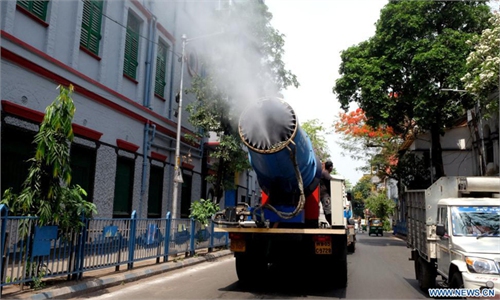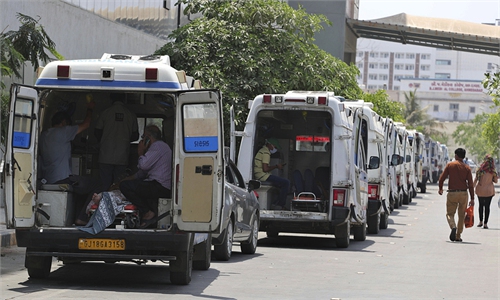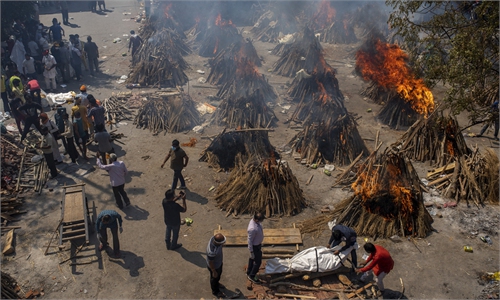India's epidemic mirrors hypocrisy of US, West
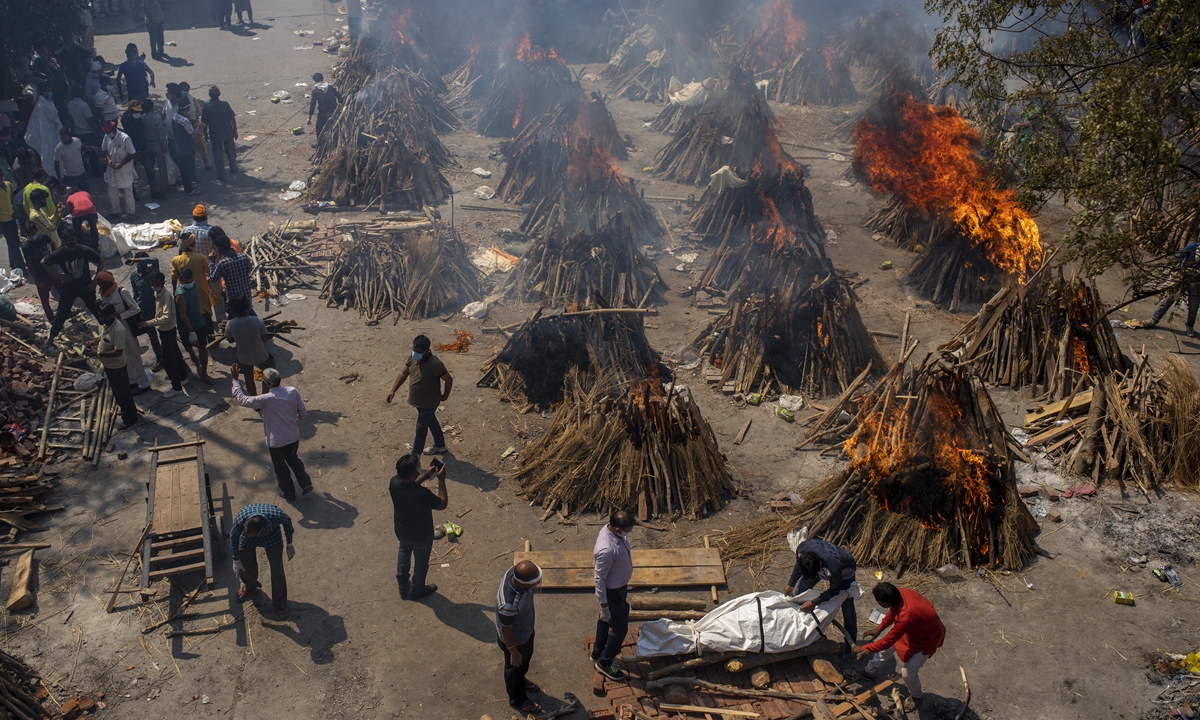
Multiple funeral pyres of COVID-19 victims burn at a site converted for mass cremations in New Delhi, India on Saturday. Indian authorities are scrambling to get medical oxygen to hospitals when the country reported a new global daily record of more than 346,000 infections for a third straight day. Photo: AP
The US has refused India's request to ease exports for vaccine raw materials. Meanwhile, India's COVID-19 epidemic is getting into its "worst possible phase." By contrast, the US has celebrated its milestone of reaching the goal of 200 million shots. How ironic!The US government has spiritually supported India in the epidemic fight in various occasions. US Secretary of State Antony Blinken tweeted on Sunday to show sympathy and support to the Indian people. He wrote, "Our hearts go out to the Indian people in the midst of the horrific COVID-19 outbreak. We are working closely with our partners in the Indian government, and we will rapidly deploy additional support to the people of India and India's health care heroes."
Nonetheless, as the US still faces challenges posed by COVID-19, it will continue to focus on meeting its domestic demands. Thus, in the near future it will be hard to see Washington give a substantial hand to other countries, including India, to fight the virus.
Countries like India should be aware that they are pawns to the US. They might be picked up when the US needs them, but then discarded like used tissue when they are not useful any more. The US has been attempting to bind India to its anti-China chariot. But when it is about support with practical moves, the US has stepped back with its commitment to take care of Americans "first and foremost." Hypocrisy of the US and the West has been exposed in this regard, together with their selfishness.
Some Indians have realized such hypocrisy. "If COVID-19 has taught us anything, it's that Western emphasis on human rights is one humungous farce," wrote K Bhattacharjee, an Indian author, at OpIndia media.
However, the US has attached special importance to India's strategic value as a leverage to suppress China. If India was weakened by the still wildly spreading COVID-19, it would obviously be less effective to the US' anti-China campaign. The US won't want to see this happen. So it is possible that Washington will reach out to New Delhi with some symbolic supports, including donations. In addition, the US-led Quad maybe has also disappointed India. At the "historic" Quad summit, the leaders of the US, Australia and Japan vowed to ramp up production of vaccines in India. This was done to counter China's vaccine distribution assistance to other countries and regions.
However, as India is more severely hit by the epidemic, both the US and Australia have issued only their vocal support. But Japan has remained silent so far. The Quad said it is committed to delivering up to 1 billion doses by the end of 2022 to address vaccine supply shortages across Southeast Asia and elsewhere. But the plan hasn't been carried out effectively. As a result, India will probably become reluctant when it comes to cooperating closely with its Quad partners.
When the US refused to help India with raw materials for vaccine, countries including China have expressed their good will to lend a hand. Actually, China has also capabilities to help its neighbor out. As a responsible major power, China clearly knows its international and regional responsibilities. It is willing to go through thick and thin together with its neighbors.
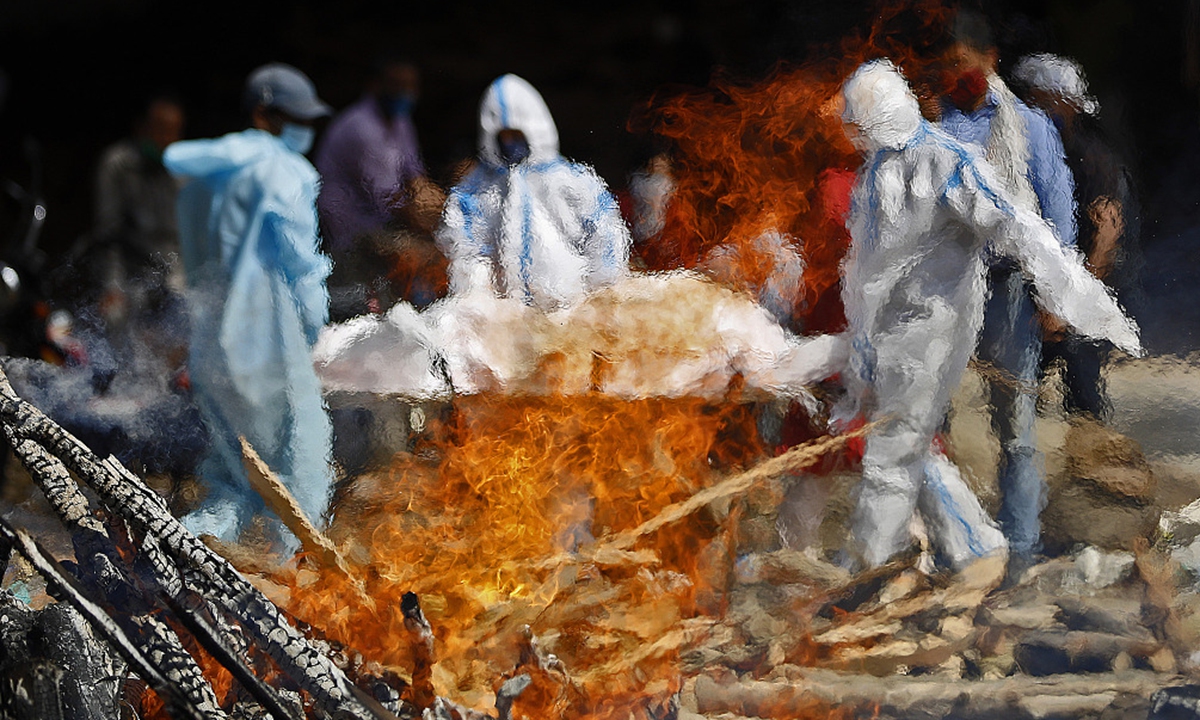
Photo:VCG
New Delhi hasn't responded to Beijing's olive branch. The Modi administration must be in a great hesitation. It desperately desires help from the international community as it is facing grave shortages of materials, including oxygen and personal protective equipment. Simultaneously, due to deteriorated relations with Beijing in recent years, New Delhi is restrained by domestic pressures from anti-China political forces.What lesson can people draw from India's failure in getting a helping hand from the US? First, a big developing and emerging country as India should primarily focus on its own epidemic prevention to maintain its people's safety. This being the case, India should put aside all unrealistic diplomatic plans. India's attempts to earn influence by aiding others with COVID-19 vaccines go against not only Indian people's interests and epidemic prevention but also the country's future development.
Second, India should keep its strategic autonomy rather than tilting toward any side. India has been an upholder of autonomous development. But due to its geopolitical needs over the past few years, India has increasingly tilted toward the US and thus engaged in a game with China. But what India has been through has proven that the US and the Quad are not reliable.
It is believed that different voices from the international community will show that the real America does not care to help India right now as infections explode across the Asian country. India can perceive a very real America because of this.
The author is director of the research department at the National Strategy Institute at Tsinghua University. opinion@globaltimes.com.cn
